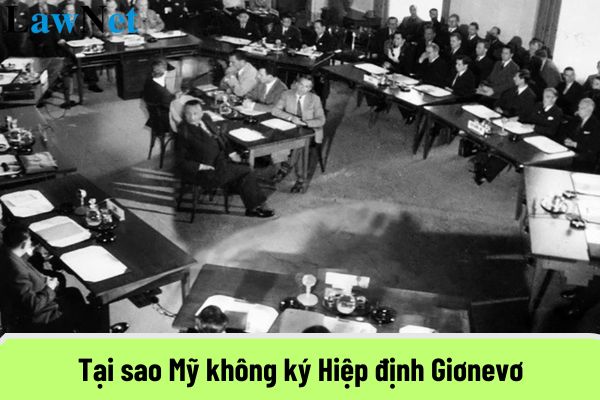Why did the United States fail to sign the Geneva Agreement? What are the notable characteristics of 12th-grade History in Vietnam?
Why did the United States fail to sign the Geneva Agreement?
The United States did not sign the Geneva Agreement due to concerns about the spread of communism, disagreements over the terms of the accords, and the strategy to contain the influence of the Soviet Union and China in Southeast Asia.
Students can refer to the following information:
|
Why did the United States fail to sign the Geneva Agreement? Belowe are some key reasons: |
*Note: The information is for reference only./.

Why did the United States fail to sign the Geneva Agreement? What are the notable characteristics of 12th-grade History in Vietnam? (Image from the Internet)
What are the notable characteristics of 12th-grade History in Vietnam?
Under the General Education Program issued with Circular 32/2018/TT-BGDDT, the characteristics of 12th-grade History in Vietnam in particular and the upper secondary level in general are as follows:
- History is a subject in the Social Sciences group, chosen based on career orientation at the upper secondary level.
- The History subject has the mission to help students form and develop historical competencies, and components of scientific competency, while also contributing to forming and developing the key traits and general competencies identified in the overall program. The History subject plays a pivotal role in educating patriotism, national pride, and historical and cultural traditions, helping students understand and apply historical lessons to solve current real-life issues, developing vision, consolidating humanistic values, community spirit, tolerance, and compassion; contributing to forming and developing the traits of Vietnamese citizens and global citizens in the trend of development of the era.
- The History subject forms and develops for students historical thinking, systematic thinking, critical thinking, skills to exploit and use historical resources, understanding and presenting history in chronological and contemporary logic, and connecting the past with the present.
- The History subject helps students perceive the scientific and practical value of history in modern social life, understand and have a love for national and human history and culture; and contribute to guiding students in choosing careers such as social and human sciences research, diplomacy, administration, tourism activities, cultural industries, information and communication, etc.
- The History subject curriculum systematizes and consolidates comprehensive knowledge at the basic education stage while helping students delve deeper into core historical knowledge through topics and study modules on world history, Southeast Asian history, and Vietnamese history. The teaching methods of the History subject are based on fundamental principles of historical science and modern educational methods.
What learning outcomes are required for 12th-grade History in Vietnam?
According to Section 4 of the High School Education Program for History issued with Circular 32/2018/TT-BGDDT (amended by Article 2 of Circular 13/2022/TT-BGDDT), the learning outcomes required for 12th-grade History in Vietnam are as follows:
(1) Key traits and general competencies
The History subject contributes to forming and developing key traits and general competencies at levels appropriate for the subject and educational level as stipulated in the overall program.
(2) Specific competencies
The History curriculum aids students in developing historical competencies based on basic and advanced knowledge of world, regional, and Vietnamese history through a system of themes and modules on political, economic, social, cultural, and civilizational history. Historical competencies consist of the following components: exploring history; understanding and thinking historically; applying learned knowledge and skills.
Specific manifestations of historical competencies are presented in the following table:
- Exploring History:
+ Identifying types of historical documents; understanding content, and exploiting and utilizing historical documents in the learning process.
+ Recalling and presenting verbally or in writing the processes of simple to complex events, characters, historical processes; identifying historical events in specific space and time.
- Understanding and Thinking Historically:
+ Explaining the origins and dynamics of historical events from simple to complex; identifying the development process of history diachronically and synchronically; comparing similarities and differences among historical events, and explaining cause-and-effect relationships in historical progress.
+ Offering personal observations and evaluations of events, characters, historical processes based on historical understanding and thinking; comprehending historical continuity and change; thinking from different perspectives when considering, evaluating, or seeking answers about a historical event, character, or process.
- Applying Learned Knowledge and Skills:
Drawing lessons from history and using historical knowledge to explain real-life issues; on this basis, having the capability to explore historical issues on one's own, developing creative capacities, accessing and processing information from various sources, having the awareness and competence for lifelong historical learning.

